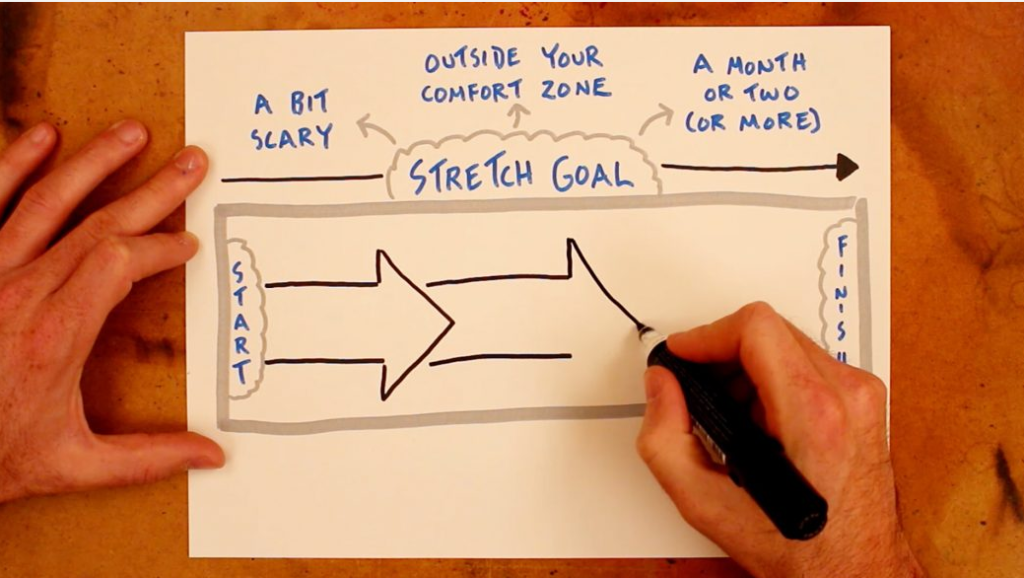[pullquote]WHEN MARISSA MAYER WAS NAMED CEO OF YAHOO, IN JULY 2012, THE MEDIA COULDN’T GET ENOUGH OF HER CANDID ASSESSMENTS OF THE AILING COMPANY’S STRENGTHS AND WEAKNESSES—AND HER AMBITIOUS GOALS TO PUT THE INTERNET GIANT BACK ON TRACK. Can Marissa Mayer save Yahoo? wondered the New Yorker, the Guardian, and Fortune. Yahoo’s annual revenues had dropped from $7.2 billion to $4.9 billion in the previous four years, employees were demoralized, and the culture was far from vibrant. In short, Yahoo had been on an extended losing streak. Mayer’s answer to this checkered performance was to bullishly proclaim that her goal was to return Yahoo to the level of the Big Four—“to bring an iconic company back to greatness.” She articulated the exceptionally difficult aim of achieving double-digit annual growth in five years and eight additional highly challenging targets.[/pullquote]

All sales managers ask for them, but few salespeople really understand them.
A “stretch goal,” simply put, is a target set above what is expected to be accomplished. It can be applied to any metric or key performance indicator.
So, why should we set stretch goals? They increase our chances of being successful.
Here are four reasons why everyone should take their goals and stretch them.
1. Productive discomfort
Let’s assume your goals are higher than last year’s. Most salespeople aren’t scared by a bigger goal; we’ve come to expect this reality. Just because the goal is higher doesn’t mean it’s going to be hard to achieve.
Stretch goals are meant to stretch us as professionals and even require us to think of new methods and strategies. They force us to think outside of the box and to try to meet new people, to explore new industries and ideas. They are meant to be uncomfortable because growth happens on the edge of our discomfort.
We get better when we are forced to do things differently. This practice is productive.
2. It builds confidence
Actual achievement builds confide
nce, accomplishing stringent performance standards year in and year out, month in and month out, no matter the conditions.
Confidence doesn’t come from motivational speeches, charismatic inspiration, or blind hope. The best thing for our confidence is to actually hit one of our stretch goals. We build momentum and find levels of performance we didn’t know existed.
3. Avoid catastrophe
By setting and pursuing stretch goals, we reduce the chances of being crippled by a big, unexpected shock. The truth is that a ferociously unstable market favors the person who sets stretch goals.
If you look back at your career, you can find examples of times that didn’t go your way, even when you desperately needed them to. Salespeople can get away with failing to set stretch goals in stable times, but doing so leaves them weak and undisciplined — and exposed when unstable times come. And those times will always come.
4. Sense of control
Setting a stretch goal is a way for us to exert self-control even when the circumstance might
be out of our control. Having a good stretch goal focuses the mind, because everyone on the team knows the markers and their importance. We can stay on track.
On the one hand, we know we will face continuous uncertainty and can’t predict significant aspects of the job we perform. On the other hand, we reject the idea that forces outside of our control or chance events will determine our results. We accept full responsibility for our results because we set the higher standard.
Even if we miss the stretch goal, chances are we hit the goal set by our manager. We planned for adversity and expected it. When we expect something, aren’t we then in control?
Take a few minutes and look at your goals. Then, ask yourself this simple question: How can I stretch them? Give yourself the competitive advantage that allows for personal confidence, productive discomfort and a sense of control so you can ultimately avoid catastrophe.
